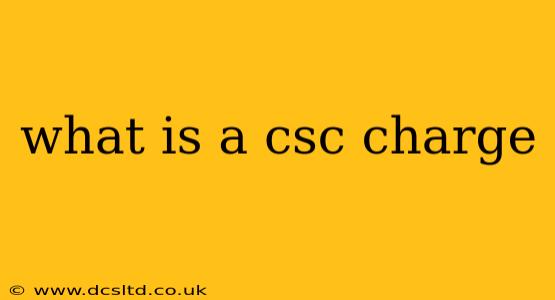A CSC charge, often appearing on your credit card statement as a "CSC fee" or similar, typically refers to a credit card surcharge. This is an extra fee added to the price of goods or services when you pay using a credit card. It's essentially a penalty for choosing to pay with plastic rather than cash or another method like debit cards. While seemingly innocuous, understanding these charges is crucial for budget management and avoiding unexpected expenses.
Why do businesses charge CSC fees?
Businesses implement credit card surcharges for several reasons, primarily revolving around the costs associated with accepting credit card payments:
-
Merchant Fees: Credit card companies charge merchants a percentage of each transaction processed, plus a per-transaction fee. These fees can significantly impact a business's profit margin, particularly for smaller businesses with lower sales volume. Surcharges help offset these costs.
-
Processing Costs: Beyond the fees charged by credit card companies, businesses incur costs associated with credit card payment processing, including equipment maintenance, software subscriptions, and potentially employee training.
-
Increased Revenue: While seemingly less ethical, some businesses may use surcharges as a way to subtly increase their revenue. This practice is often viewed negatively by consumers.
Are CSC charges legal?
The legality of credit card surcharges varies significantly by location. Some countries and regions have strict regulations governing surcharges, while others have more lenient rules or no explicit prohibitions. It's vital to check your local consumer protection laws to understand the regulations in your area. In some places, businesses are required to clearly disclose surcharges upfront, while in others, they might be completely forbidden, especially for certain types of businesses.
How can I avoid CSC charges?
Several strategies can help you minimize or avoid CSC fees:
-
Pay with cash or debit cards: The most straightforward method is to pay with cash or a debit card, as these payment methods generally don't incur surcharges.
-
Use a different payment method: Some businesses offer discounts or incentives for using specific payment methods, such as store credit cards or digital wallets.
-
Shop at businesses that don't charge surcharges: Many businesses choose not to levy surcharges, focusing on absorbing the credit card processing fees into their overall pricing. You can find such businesses through online reviews or word-of-mouth.
-
Check for surcharges upfront: Before making a purchase, carefully check for any mention of credit card surcharges on the business's website, signage, or receipts.
What if a business charges a CSC fee without notice?
If a business adds a credit card surcharge without clearly informing you beforehand, you have several options, depending on your location's consumer protection laws. You might be able to:
-
Dispute the charge with your credit card company: In some cases, credit card companies might be willing to reverse the surcharge if it was added deceptively or in violation of local laws.
-
File a complaint with your local consumer protection agency: This is a viable option if the business's practices violate relevant regulations.
Is a CSC charge the same as a transaction fee?
While both CSC charges and transaction fees relate to credit card payments, they are distinct. A transaction fee is typically a fee charged by the merchant to the consumer for processing the credit card payment, usually regardless of the payment method used. A CSC charge, on the other hand, is specifically an extra fee added to the price of the goods or services because the consumer is using a credit card. They can exist simultaneously.
In conclusion, understanding CSC charges (credit card surcharges) is essential for managing your finances effectively. Always be aware of potential surcharges before making purchases and familiarize yourself with your local laws regarding their legality and disclosure requirements.
